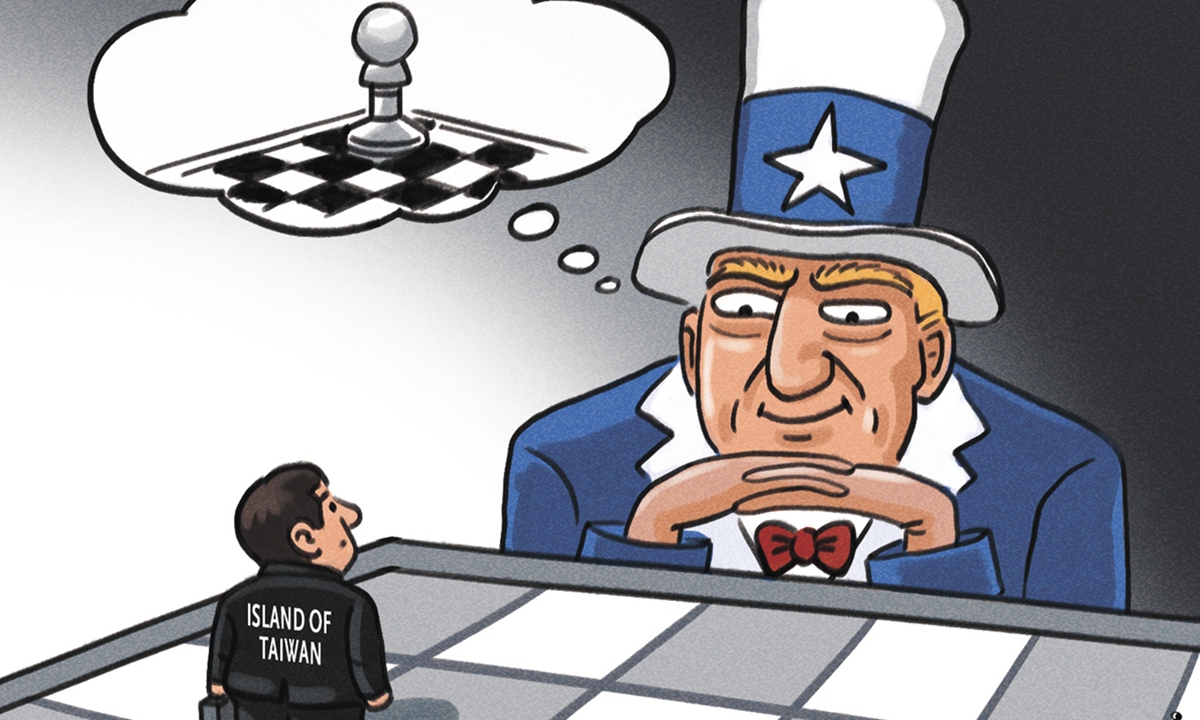To American politicians, Taiwan is a tradable pawn
By Wang Wenwen Source: Global Times Published: 2020/8/23 22:15:06

Illustration: Liu Rui/GT
A resolution introduced by US Senator Martha McSally and co-sponsored by Senator Marsha Blackburn calls on China to repay US bondholders more than $1.6 trillion of sovereign debt. A House measure led by Republican Mark Green is also reportedly forthcoming. Voice of America cited US analysts saying that as long as the US acknowledges the "one-China" policy, Beijing is the sole successor of the debts of the Republic of China.
The bonds were issued in 1912 by the Republic of China, whose government and forces fled to Taiwan in 1949.
The basis of the establishment of diplomatic ties between China and the US is US acknowledgement of the "one-China" principle. But as China-US competition intensifies, the Taiwan question has increasingly been politicized by Washington and played as a leverage to challenge China. By asking China to repay the debt, these US politicians delivered this message: For the US, the Taiwan question is tradable and if Beijing pays, they will stop pestering over it.
The mentality of US politicians toward China-US relations as traders is fully exposed. They also expose themselves to the world, including the island of Taiwan, that they will only treat their so-called pledge to Taiwan as nothing but a deal.
In recent years, the US Congress has passed several Taiwan-related acts which presumably support Taiwan, for instance the Taiwan Travel Act of 2018, the Asia Reassurance Initiative Act of 2018, the Taiwan Assurance Act of 2019 and the Taiwan Allies International Protection and Enhancement Initiative Act of 2019. The National Defense Authorization Act of recent years also highlights US support for the development of Taiwan's military.
For Taiwan, these acts are like poisonous drinks to quench its thirst, but the US will never provide the security guarantee Taiwan desires. A study by the US Quincy Institute in June found that Taiwan funded some US think tanks so that they would produce policy papers urging closer US ties with Taiwan that are in favor of Taiwan authorities. That is how those "Taiwan friendly" acts came into being, and Taiwan should not expect the US to take these acts seriously.
In his memoir The Room Where It Happened released in June, former national security advisor John Bolton predicts that Taiwan is the next place Trump will drop after his abandonment of the Kurds.
As early as 2011, Paul V. Kane, a former international security fellow at the Harvard Kennedy School, writing in The New York Times, urged then president Barack Obama to ditch Taiwan to save the US economy. He suggested the US end military assistance and arms sales to Taiwan in exchange for China writing off the $1.14 trillion of American debt.
Obviously, the idea that Taiwan can be traded has always been on the minds of US politicians. Taiwan is a useful chess piece for the US only because of the US strategy to suppress the Chinese mainland. On the one hand, Washington exploits the Taiwan question to contain China, on the other hand it is inciting tensions and making money by selling arms to Taiwan.
Taiwan for the US is only a tradable chess piece, but for the mainland, reunification of the mainland and Taiwan is priceless.
RELATED ARTICLES:
Posted in: OBSERVER,CHINA-US